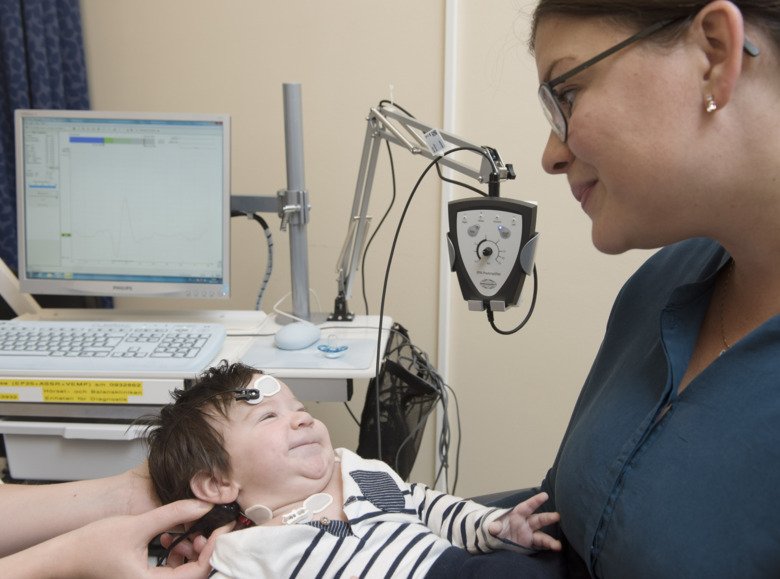Research projects at SCAPA
Ongoing research projects connected to Scientific center for advanced pediatric audiology - SCAPA

Causes for congenital hearing loss
The goal of the project is to identify and diagnose various types of congenital sensorineural hearing losses. What mechanisms are involved? The question is important to answer for the development of future treatment options.
Do you want to get in touch with SCAPA regarding this project? Please contact erik.berninger@ki.se
The effect of early treatment of hearing loss
In this project, we study the impact of age at intervention. Our hypothesis is that relevant stimulation of the auditory system should occur early in life for optimal development of hearing.
Sound localization as a diagnostic tool
The ability to know where a sound is coming from is important for spatial hearing and communication. Sound localization is dependent on sophisticated neural processing and develops during the first 5 years of life. We develop child-friendly methodology based on eye-tracking for assessment of sound localization from 6 months of age. The goal is new diagnostic possibilities.
Do you want to get in touch with SCAPA regarding this project? Please contact filip.asp@ki.se
Congenital hearing loss in one ear
Children with hearing loss in one are at risk for delayed speech- and language development and struggle in acoustically challenging conditions. Two research projects within SCAPA investigates treatment benefits for unilateral hearing loss, and how the central auditory system is affected. One of the projects focuses on the most common type of congenital hearing loss where the impairment resides in the inner ear and/or the auditory nerve. About 75 children are born each year in Sweden with this type of hearing loss.
Do you want to get in touch with SCAPA regarding this project? Please contact erik.berninger@ki.se
In the other project, we study hearing loss in one ear where the cause is a missing ear canal since birth. About 20 children are born each year in Sweden with this condition. The hearing loss caused by this condition may be treated with various hearing implants or reconstruction of the ear canal.
Do you want to get in touch with SCAPA regarding this project? Please contact cecilia.engmer@ki.se
Predictors of early auditory and spoken language development
Despite early detection and fitting of hearing aids and/or cochlear implants, children with hearing loss show delays in their speech and language development. In this longitudinal project, we investigate the early auditory, speech and language development (0-3 years) and how this is affected by auditory-related factors. The purpose is to develop clinically useful methods that can predict later outcomes and to identify children at risk as early as possible.
Do you want to get in touch with SCAPA regarding this project? Please contact anna.persson.3@ki.se
Vestibular function in children
The vestibular organ, a part of the inner ear, has an important role for balance, movement and navigation. In children, these abilities are important for motor development. In 2015, a research program was initiated with the overall aim of developing valid methods for measuring vestibular function from infancy. We have demonstrated that this is possible with carefully adapted methodology. The findings are partly clinically implemented and used in preoperative assessment of children that are candidates for cochlear implantation.
Do you want to get in touch with SCAPA regarding this project? Please contact luca.verrecchia@ki.se
A rapid and objective method for diagnosis of hearing loss in children
Auditory brainstem responses – the electrocardiogram of the ear – allow determination of type and degree of hearing loss. SCAPA has developed a method to rapidly and reliably identify auditory brainstem responses. The objective analysis may be used for estimating hearing thresholds, diagnostics and as a basis for hearing aid fitting in young children.
Malformations of the inner ear
The Karolinska hearing implant clinic has, through national specialized medical care, contact with the largest group of children with cochlea malformations in Sweden. This has led to a deep understanding of this patient group. Hearing and speech results can be very difficult to predict in this group and they often show evidence of other neurological abnormalities. We currently study the long-term outcomes in these patients and assess whether they would benefit from alternative assessment or treatment plans to those we currently offer.
Do you want to get in touch with SCAPA regarding this project? Please contact jeremy.wales@ki.se
Early cochlear implantation – How well does it work when children become adults?
Cochlear implantation for children with severe-to-profound hearing loss has been performed in Sweden since 1991 and is a clinical routine since 20 years. While hearing and language outcomes are on average good, individual variability is high. The goal of this interdisciplinary project is to identify the sources of this variability, gain deeper knowledge on children’s hearing, language and quality of life as they transition to adulthood.
Do you want to get in touch with SCAPA regarding this project? Please contact eva.karltorp@sll.se or ulrika.lofkvist@ki.se
Words make a difference
Children with hearing loss are a heterogeneous population, and there is a great deal of individual variability in children's speech and language development. How parents communicate with their children is a factor that could explain part of this variability. In this project, quantitative and qualitative aspects of verbal communication between parents and their children are examined.
Language Environment Analysis (LENA) can be compared to a pedometer for words and is used in our three sub-studies for estimating younger children's listening and spoken language environment. Researchers and clinics from different regions in Sweden actively participate in this research.
Do you want to get in touch with SCAPA regarding this project? Please contact ulrika.lofkvist@ki.se
